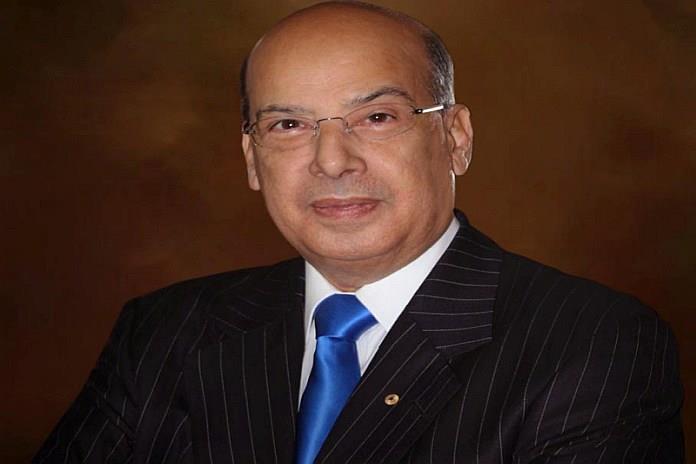
Antigua Ambassador: The Urgency Of Cosis' To Seek Climate Justice Through Itlos
– Sir Ronald Sanders presentation was made on September 7th in Washington, DC at a High-Level conference on Climate Change, organised jointly by the Antigua and Barbuda Embassy in Washington and the Think Tank, Global Americans. The conference was attended by representatives of Caribbean and Latin American governments and representatives of theGovernment and Congress.
By Sir Ronald Sanders
Two years ago, in the margins of the COP 26 meeting in Glasgow, two small island states in two different parts of the world, took a decision to form an inter-governmental organization that would use the international legal system to seek justice for the considerable impact of Climate Change on their countries.
The prime ministers of Antigua and Barbuda in the Caribbean and Tuvalu in the Pacific, frustrated by the lip service being paid by the world's major contributors to Climate Change, and the broken promises of every previCOP meetings, decided that they would seek an advisory opinion from the International Tribunal of the Law of the Sea (ITLOS).
Consequently, they launched the Commission of Small Island States on Climate Change and International Law (COSIS).
They were subsequently joined by several other small states, including the Bahamas, Saint Lucia, St Kitts-Nevis and St Vincent and the Grenadines in the Caribbean and by Vanuatu, Palau and Niue.
ITLOS has agreed to full hearing of the case that small island states are advancing.
The first session will be held in Hamburg – on September 11th.
What each of these small islands faces is a real and present threat to their existence.
The gravity of the situation
Let's put into perspective the level of existential threat we're talking about.
We are looking at the potential disappearance of nations -entire cultures and histories wiped out due to climate change.
This is not mere theory; the science is clear and irrefutable. The primary culprits are the major polluters who have, tfar, shown a staggering lack of political will to remedy their actions.
COSIS: A mandate for justice
COSIS has a straightforward mandate: to develop rules and principles of international law to fight climate change.
Time is of the essence, and the stakes are as high as they could possibly get – the very survival of these countries and their people.
It isn't about politics; it's about the sanctity of human life and our shared planet.
Why ITLOS?
Why go to ITLOS? Small island nations are primarily maritime states. They depend on the ocean not just for sustenance, but as a crucial part of their heritage and identity.
But there's more. The ocean is a vital carbon sink.
With increasing ocean temperatures reaching record highs this summer, all nations must act now to safeguard this critical component of Earth's climate system.
ITLOS, the guardian of the 1982 UN Convention on the Law of the Sea, is the natural venue to seek legal clarity on the obligations of states to protect our marine environment.
Compensation and the principle of equity
One of the most glaring injustices is that while small island states contribute the least to climate change, they suffer the most from its ravages.
The situation calls not just for mitigation but also for compensation. The concept of loss and damage must be squarely addressed. We are not just talking about climate change adaptation but also about building resilience against future threats.
All these require substantial financing. If justice is to be served, major polluters must be held financially accountable.
The advisory opinion: A beacon of hope
By going to ITLOS, we are not seeking to rewrite laws; we are seeking clarity on existing ones.
What are states obligated to do under the UN Convention on the Law of the Sea?
Small states need authoritative, scientific answers on this critical issue; but so too – do the major contributors to Climate Change – there must be clear guidance on the consequences of their actions.
This advisory opinion from ITLOS can serve as a benchmark, a guidepost, for international actions going forward.
Conclusion: The hour of decision
We are at a fork in the road of human history. On one hand, inaction and the continuation of empty promises, leading to existential loss for small island states.
On the other, immediate, effective action informed by international law. And, we should all understand this reality.
As climate change continues to simultaneously burn our world, while flooding it; as Climate change upends weather patterns, ruining food production, and creating water shortages; as glaciers melt and the levels of seas rise, drowning small islands and eroding coastal areas; as people are displaced from their natural habitats and seek refuge on other shores, small island states are the first to suffer; but they will not be the last.
All are involved and all will be consumed.
So to quote John Donne:“Do not ask for whom the bell tolls; it tolls for everyone.”
Small Island States are working to tip the scales towards justice and survival. But our plea is not just for us; it is for the health of a plwe all share.

Legal Disclaimer:
MENAFN provides the information “as is” without warranty of any kind. We do not accept any responsibility or liability for the accuracy, content, images, videos, licenses, completeness, legality, or reliability of the information contained in this article. If you have any complaints or copyright issues related to this article, kindly contact the provider above.
Most popular stories
Market Research

- Manuka Honey Market Report 2024, Industry Growth, Size, Share, Top Compan...
- Modular Kitchen Market 2024, Industry Growth, Share, Size, Key Players An...
- Acrylamide Production Cost Analysis Report: A Comprehensive Assessment Of...
- Fish Sauce Market 2024, Industry Trends, Growth, Demand And Analysis Repo...
- Australia Foreign Exchange Market Size, Growth, Industry Demand And Forec...
- Cold Pressed Oil Market Trends 2024, Leading Companies Share, Size And Fo...
- Pasta Sauce Market 2024, Industry Growth, Share, Size, Key Players Analys...





















Comments
No comment